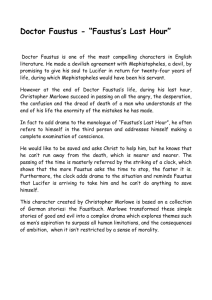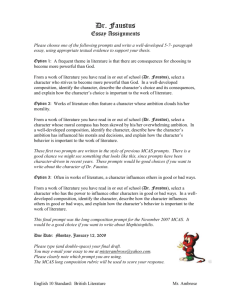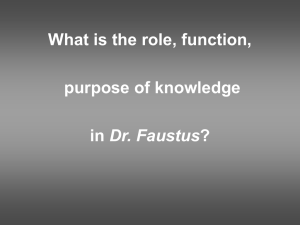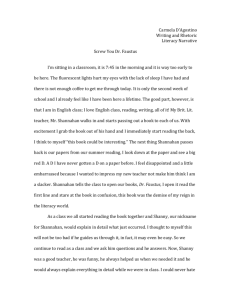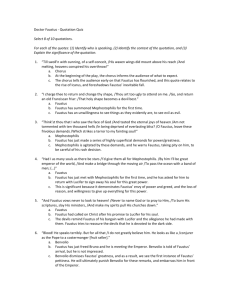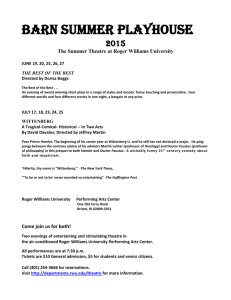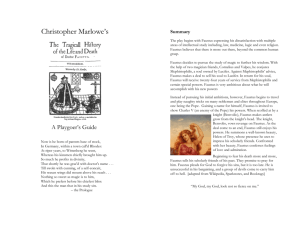faustus summary
advertisement
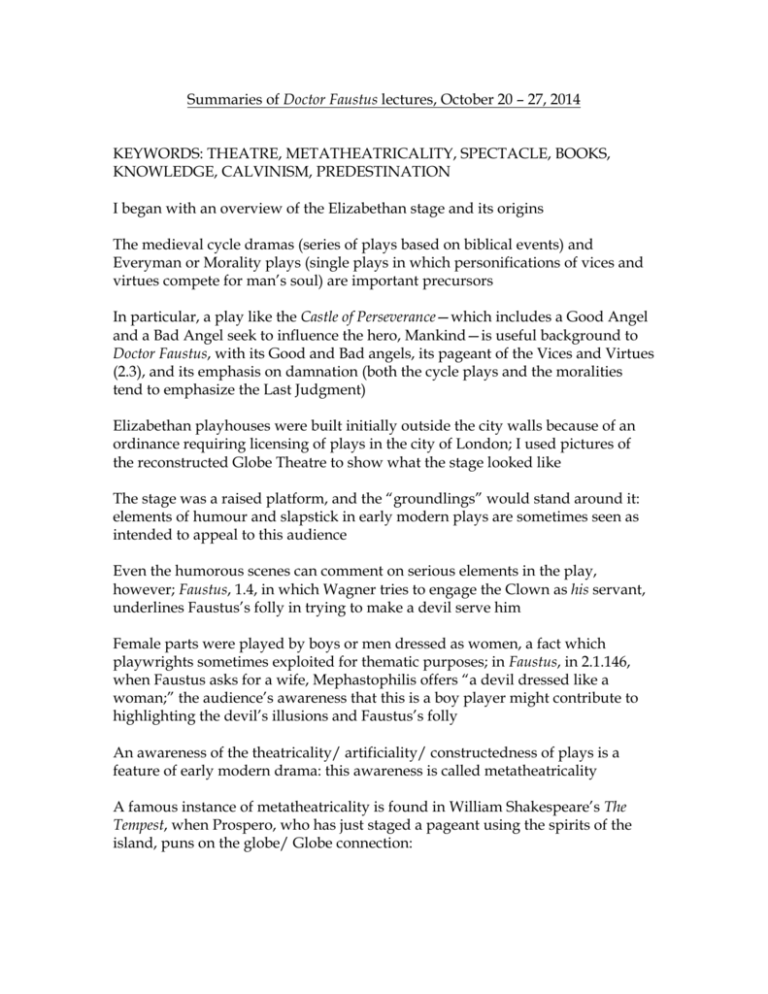
Summaries of Doctor Faustus lectures, October 20 – 27, 2014 KEYWORDS: THEATRE, METATHEATRICALITY, SPECTACLE, BOOKS, KNOWLEDGE, CALVINISM, PREDESTINATION I began with an overview of the Elizabethan stage and its origins The medieval cycle dramas (series of plays based on biblical events) and Everyman or Morality plays (single plays in which personifications of vices and virtues compete for man’s soul) are important precursors In particular, a play like the Castle of Perseverance—which includes a Good Angel and a Bad Angel seek to influence the hero, Mankind—is useful background to Doctor Faustus, with its Good and Bad angels, its pageant of the Vices and Virtues (2.3), and its emphasis on damnation (both the cycle plays and the moralities tend to emphasize the Last Judgment) Elizabethan playhouses were built initially outside the city walls because of an ordinance requiring licensing of plays in the city of London; I used pictures of the reconstructed Globe Theatre to show what the stage looked like The stage was a raised platform, and the “groundlings” would stand around it: elements of humour and slapstick in early modern plays are sometimes seen as intended to appeal to this audience Even the humorous scenes can comment on serious elements in the play, however; Faustus, 1.4, in which Wagner tries to engage the Clown as his servant, underlines Faustus’s folly in trying to make a devil serve him Female parts were played by boys or men dressed as women, a fact which playwrights sometimes exploited for thematic purposes; in Faustus, in 2.1.146, when Faustus asks for a wife, Mephastophilis offers “a devil dressed like a woman;” the audience’s awareness that this is a boy player might contribute to highlighting the devil’s illusions and Faustus’s folly An awareness of the theatricality/ artificiality/ constructedness of plays is a feature of early modern drama: this awareness is called metatheatricality A famous instance of metatheatricality is found in William Shakespeare’s The Tempest, when Prospero, who has just staged a pageant using the spirits of the island, puns on the globe/ Globe connection: Our revels now are ended. These our actors, As I foretold you, were all spirits and Are melted into air, into thin air: And, like the baseless fabric of this vision, The cloud-capp’d towers, the gorgeous palaces, The solemn temples, the great globe itself, Ye all which it inherit, shall dissolve And, like this insubstantial pageant faded, Leave not a rack behind. We are such stuff As dreams are made on, and our little life Is rounded with a sleep. The stage becomes a metaphor for human life—as Shakespeare has a character in As You Like It say, “All the world’s a stage”—so if we are all actors, who is writing the script and directing the play? In Marlowe’s day, England was a Protestant nation, and Doctor Faustus explores issues of free will, predestination, and moral choice in a Calvinist framework John Calvin (1509-1564) was a theologian whose version of predestination was particularly stark: “All are not created on equal terms, but some are preordained to eternal life, others to eternal damnation; and, accordingly, as each has been created for one or other of these ends, we say that he has been predestinated to life or to death.” The Good Angel often calls Faustus to repent, but can he do so? There are two versions of Doctor Faustus. One of the small differences between these versions (there are big differences too) is that the A version (1604) has the Good Angel say “If Faustus can repent,” while the B version (1616) reads “If Faustus will repent” If Faustus is predestined to damnation, he cannot repent; the B version’s use of “will” seems to allow for more choice Certainly the play seems to foreground knowledge and its potential dangers, in a way that seems to suggest we need to be careful about our choices: the Prologue makes an allusion to Icarus who, seeking to fly too near the sun, dies when his wax wings melt and he plummets into the sea Faustus is associated from the start with books: he discards the Bible and the usual texts of humanistic learning, and is attracted to occult books: we talked about whether the audience’s awareness of the prop books (wooden models rather than real books, perhaps) might be another metatheatrical moment that could cause reflection on Faustus and his choices Faustus is “ravish’d” by magic and “desires” the lavish books: is desire a problem in the play? Faustus is a glutton, saying of himself, 2.1.11, “The god thou servs’t is thine own appetite” But Faustus gets nothing real from Mephastophilis: the demon can provide spectacle, as can Faustus later on, but he answers none of Faustus’s questions about who created the world Lucifer stages the pageant of the Seven Deadly Sins, another spectacle Faustus seems to use his powers mostly for foolish and frivolous ends, though he does conjure up a vision of Alexander the Great so convincing that the king, despite Faustus having told him he cannot conjure up “true substantial bodies,” nevertheless takes the spectacle for reality This is the power—and the danger—of the theatre; it can convince us that we are seeing the real, even when it tells us we are simply witnessing spectacle, illusion ©Siân Echard. Not to be copied, used, or revised without explicit written permission from the copyright owner.
